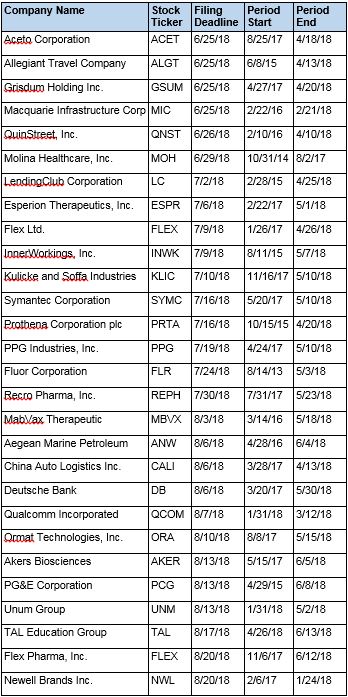Qualcomm Class Action Lawsuit
Levi & Korsinsky, LLP
June 22, 2018
On June 8, 2018, investors sued Qualcomm, Incorporated (“Qualcomm” or the “Company”) in United States District Court, Southern District of California. Investors in the federal securities class action allege that they acquired Qualcomm stock at artificially inflated prices between January 31, 2018 and March 12, 2018 (the “Class Period”). They are now seeking compensation for financial losses incurred upon public revelation of the Company’s alleged misconduct during that time. Here’s everything you need to know about the Qualcomm class action lawsuit (QCOM class action lawsuit):
Summary of the Allegations
Company Background
Qualcomm (NASDAQ: QCOM) is a self-described “pioneer in 3G (third generation) and 4G (fourth generation) wireless technologies.” It also claims that it is a “leader in 5G (fifth generation) wireless technologies to empower a new era of intelligent, connected devices.” As such, it generates the bulk of its revenue through the sales of “integrated circuit products” and the licensing of intellectual property.
According to its website, Qualcomm was founded in 1985 and became a public company six years later. After reaching several milestones in the late 20th and early 21st centuries, the Company says it became “the world’s leading mobile chipset provider” in 2007.
Summary of Facts
The Company and two of its senior executives and/or directors currently stand accused of deceiving investors by lying and or withholding critical information about Qualcomm’s business practices during the Class Period.
Specifically, they are accused of omitting truthful information about certain actions taken by the Company from SEC filings and related material. By knowingly or recklessly doing so, they allegedly caused Qualcomm stock to trade at artificially inflated prices during the time in question.
The truth about what Qualcomm did to try and prevent Broadcom Limited (“Broadcom”) from acquiring it emerged in a series of events that began when Broadcom issued a press release on March 5, 2018. In it, Broadcom said it had just learned that Qualcomm secretly requested that the Committee on Foreign Investment in the United States (“CFIUS”) investigate Broadcom’s attempts to acquire the Company. Broadcom also described the move as a “blatant, desperate act” designed to “entrench [Qualcomm’s] incumbent board of directors and prevent its own stockholders from voting for Broadcom’s independent director nominees.”
Nevertheless, one week later Qualcomm filed with the SEC a form along with a letter that it had received from the U.S. Department of Treasury. In it, the Treasury Department confirmed that CFIUS had identified “potential national security concerns” during the investigation requested by Qualcomm.
Then, after the market closed on March 12, 2018, U.S. President Donald J. Trump acted on CFIUS’ recommendation and issued an order “blocking Broadcom from taking further action regarding its proposed acquisition of Qualcomm.”
A closer look…
As alleged in the June 8 complaint, Qualcomm repeatedly made misleading public statements throughout the Class Period.
For example, on a form filed with the SEC at the beginning of the Class Period, the Company discussed Broadcom’s plan, saying in pertinent part: “On November 12, 2017, following a comprehensive review conducted in consultation with financial and legal advisors, our Board of Directors unanimously rejected the Proposed Transaction, concluding that it dramatically undervalues the Company.”
On the same form, Qualcomm said that it was “subject to a disruptive takeover proposal” and that, “we may not be able to attract and retain qualified employees.”
However, Qualcomm did not disclose that it had recently approached CFIUS about the investigation.
Impact of the Alleged Fraud on Qualcomm’s Stock Price and Market Capitalization
| Closing stock price prior to disclosures:
|
$62.81 |
| Closing stock price the trading day after disclosures:
|
$59.70 |
| One day stock price decrease (percentage) as a result of disclosures:
|
4.95% |
The following chart illustrates the stock price during the class period:
Actions You May Take
If you have purchased shares during the Class Period, you may join the class action as a lead plaintiff, remain a passive class member, or opt out of this litigation and pursue individual claims that may not be available to the class as a whole.
NOTE: The deadline to file for lead plaintiff in this class action is August 7, 2018. You must file an application to be appointed lead plaintiff prior to this deadline in order to be considered by the Court. Typically, the plaintiff or plaintiffs with the largest losses are appointed lead plaintiff.
In order to identify your potential exposure to the alleged fraud during the time in question, you may wish to perform an analysis of your transactions in Qualcomm common stock using court approved loss calculation methods.
Recently Filed Cases
Listed below are recently filed securities class action cases being monitored by us, along with the class period and the deadline to file a motion to be appointed as the Lead Plaintiff in the action. Please contact us if you would like an LK report for any of these cases:
About Us
| This information is provided for general information purposes only, and should not be construed as legal advice, nor does it establish an attorney-client relationship with Levi & Korsinsky LLP. Any and all information herein is simply an opinion based on publicly available information and should not necessarily be construed as fact. For more information, please visit our website at www.zlk.com.
Attorney Advertising
|
Levi & Korsinsky is a leading securities litigation firm with a hard-earned reputation for protecting investors’ rights and recovering losses arising from fraud, mismanagement and corporate abuse. With thirty attorneys and offices in New York, Connecticut, California and Washington D.C., the firm is able to litigate cases in various jurisdictions in the U.S., England, and in other international jurisdictions.
Levi & Korsinsky provides portfolio monitoring services for high-net worth investors and institutional clients. Our firm also assists investors in evaluating whether to opt-out of large securities class actions to pursue individual claims.
For additional information about this case or our institutional services, please contact us.
